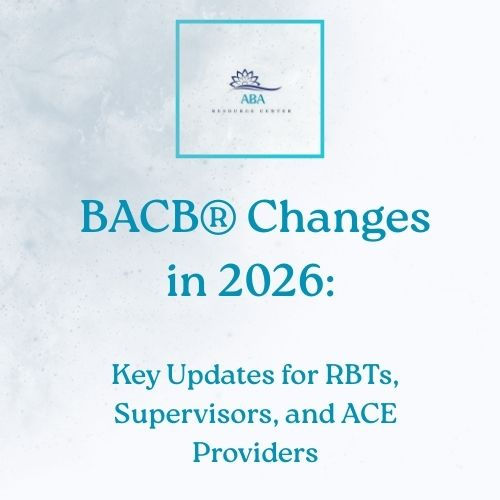How to Prepare for the BCBA Exam: Your Comprehensive Guide to Success
- Ashleigh Evans (BCBA)
- Aug 23, 2025
- 7 min read
Updated: Oct 17, 2025
The Board Certified Behavior Analyst (BCBA) exam is notoriously difficult, with only 54% of candidates passing on their first try and 25% passing on subsequent attempts. With this information, embarking on study preparations can feel intimidating. However, we encourage candidates to use it as motivation.
It's not an easy test for a reason. To be a competent and successful behavior analyst, a deep understanding of behavior-analytic principles, ethical guidelines, assessment methods, and intervention strategies is necessary. While a written test can’t capture every skill you’ll need in practice, it ensures that candidates have the foundational knowledge needed for the role.
While the big exam is incredibly challenging, you can pass it with the right study materials and approach. In this guide, we'll walk you through actionable strategies and share resources to help you comprehensively prepare to pass the BCBA exam on your first try.
Set Yourself Up For Success: Increase Your Chances of Passing the BCBA Exam
There are a few ways you can increase your likelihood of passing the BCBA exam before you even get to the point of studying. It begins with two key steps on your BCBA certification pathway: selecting the right degree program and gaining quality fieldwork experience.
1. Degree or Verified Course Sequence
Not every applied behavior analysis program is created equally. Some are better equipped to prepare you for success. The Behavior Analyst Certification Board (BACB) publishes annual pass rates based on the university training program. Candidates can use this information to make informed decisions about the program they attend.
Take a look at the BCBA Examination Pass Rates for University Training Programs (2024) to review pass rates before you choose a program. If you're already in a program or have graduated, don't fret. Attending a university with a low pass rate does not mean you won't pass. However, it could mean you'll need to commit to more study efforts.
2. Supervised Fieldwork Experience
The supervised fieldwork experience is arguably the most critical component to becoming a competent and ethical behavior analyst. A high-quality, comprehensive experience, with practical application of behavior-analytic skills, not only prepares you for your future role, but it can also prepare you for the big exam.
If you're feeling as though your experiences are subpar, don't be afraid to speak up. Ask questions, provide your supervisor with feedback, and consider locating a different supervisor if it's not a good fit. Check out the BCBA Remote Supervisor Database to find a supervisor who can better meet your needs.
Create a Study Plan
First things first, you need a game plan. How will you approach the beast? Effective preparation is key. Consider the following elements to create your study plan.
Decide When to Begin
This will vary for everyone, but a good rule of thumb is to dedicate at least 2-4 months of solid study efforts before sitting for the exam. Some people prefer to begin studying while completing their degree program, while others choose to hold off until after graduation, so they can devote their undivided attention to study sessions. I recommend the latter.
Plan Your Study Time
Be realistic about how many hours you can reasonably spend studying each week. Aim for at least ten hours per week, though the number of hours you need will depend on when you're sitting for the exam and your relative confidence in the test content.
Break Down the Test Content Outline (TCO)
Divide the 6th ed TCO down into manageable chunks, focusing on individual tasks or domains. For example, plan to study Domain A (behaviorism and philosophical foundations) during week 1. Next, because Domain B (Concepts & Principles) has the most tasks and makes up one of the largest percentages of the exam, you might plan to dedicate the following 3-4 weeks to it.
Get Organized
Before diving into the material, set yourself up for success by getting organized. Gather a copy of the test content outline, ethics code, your notes, study guides, SAFMEDS, and mock exams in one place. Many people put everything into one big binder. Also, create a digital or physical calendar to map out your study sessions. You may even want to create a data sheet to monitor your progress on metrics such as your SAFMEDS and mock exam scores.
Block Study Time into Your Schedule
Don't leave it to chance that you'll find the time to study. Instead, create a study schedule and block the time in your planner.
Select Study Materials
Now, on to the study materials you'll use to prepare for the exam. There are countless BCBA study prep resources on the market, and choosing the right ones can feel overwhelming. How do you know you’re using accurate, up-to-date materials that truly prepare you for the real exam? Consider the following when selecting your study materials.
Created by a BCBA/Reputable Company
As AI has taken over in recent years, there has been an increase in AI-generated study materials, which often contain low-quality content and inaccuracies. Seek out materials created by BCBAs and sold through reputable vendors.
Updated Content
Look for resources that are based on the 6th ed test content outline (TCO). While resources based on the 5th edition task list can provide value, they may be missing key content that falls under the most recently updated version.
Materials with Detailed Explanations
Practice exams without explanations have limited usefulness. When exploring mock exams, look for those that offer detailed breakdowns of the correct answers.
Consider Your Learning Style
How do you learn best? For example, some candidates prefer to review written study guides, while others enjoy interactive videos.
Peer Recommendations
Ask colleagues or other peers, especially those who have tested recently, for recommendations on materials that they feel best prepared them for the big ABA exam.
Tip: To offset costs, check with your employer to see if they reimburse the cost of study materials.
Resources to Use to Prepare for the BCBA Exam
We recommend using a variety of resources to study. Consider using the following resources to prepare for your BCBA or BCaBA exam.
A Study Guide
A comprehensive study guide is the foundation of your study preparations! We recommend the Pass the Big ABA Exam 6th Edition Study Manual. This comprehensive guide breaks down every task within the TCO, along with helpful study tips. The ABA Essentials Visual Study Manual is another great resource.
SAFMEDS
These are key to developing fluency. When you're taking the exam, you not only need to understand the concepts, but you also need to be able to quickly recall that information. You can either purchase pre-made SAFMEDS or you can make them yourself.
BCBA Practice Exams
As you develop mastery of key concepts, you need to practice applying them to practice questions. Mock exams are an essential way to prepare.
Here are a few recommendations:
Join ABA study groups on Facebook. You can find free BCBA mock exams and daily practice questions in these groups.
The Six-Hour YouTube Mock Exam Companion, created by Jessica Leichtweisz, is an excellent, comprehensive practice exam. This book corresponds to Jessica's YouTube video, where she goes through a complete breakdown of a full-length mock exam.
The ABA Wizard Study App is a nice way to squeeze in study prep on the go. Arrive 10 minutes early to a session? Pull out your phone and answer a few practice questions.
BDS modules are incredibly comprehensive. Some candidates find them to be aversive due to the intensity. However, they do offer a money-back guarantee if you complete the program but don't pass the exam.
Ethics Study Prep
13% of the exam encompasses questions on ethics and professionalism, so don't neglect this area of study prep. The Ethics for Behavior Analysts text is an excellent tool for understanding the ethics of ABA.
The "White Bible"
Don't be quick to get rid of your Cooper textbook after graduation. It can be invaluable when studying!
Study Courses
Look into on-demand or live study courses that break down the BCBA task list items. Behavior Webinars has several options for study courses, along with mock exams and study guides.
Other Behavior Analyst Study Options
If you prefer to study with others, you might want to consider interactive study prep options. Look into creating or joining a study group. If you need more direct support, consider seeking a tutor.
What's on the BCBA Exam?
Now, let's take a step back and review what to expect on the exam. The BCBA exam includes 185 questions. Ten of those are unscored pilot questions, but you won't know which ones aren't scored. All questions are multiple choice with four potential answers.
As of 2025, the questions on the big exam are based on the 6th ed test content outline, formerly known as the task list.
Take a look at the BACB's Test Content Outline to learn more about all of the task list items included in each domain.
Final Thoughts: Preparing for the BCBA Exam
The BCBA exam is tough, but with the right approach, it’s absolutely manageable. By setting yourself up with a strong study plan, choosing high-quality applied behavior analysis study materials, and dedicating time and effort toward preparations, you can enter that Pearson Vue test center feeling prepared and confident to take on the big exam. We wish you all the best on your exam and in your future career as a Board Certified Behavior Analyst!
Ready to explore BCBA job opportunities? Check out the ABA Job Board to find your next position.
References
Behavior Analyst Certification Board. (2025). Board certified behavior analyst handbook. https://www.bacb.com/bcba-handbook
Behavior Analyst Certification Board. (2025). BACB annual data report. BACB. https://www.bacb.com/about/bacb-certificant-annual-report-data/
Behavior Analyst Certification Board. (2022). BCBA test content outline (6th ed.). https://www.bacb.com/wp-content/bcba-outline-6thEd/
Partnership & Transparency Disclaimer
The content we share on ABA Resource Center is reader-supported. This means that if you click on certain links and make a purchase, we may earn a small referral fee. Rest assured, we only recommend tools, resources, and services that we genuinely believe add value to the ABA field.






Comments